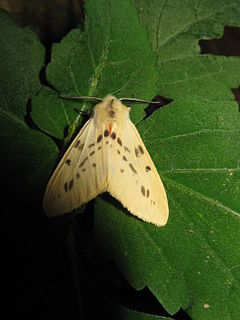
Lemyra is a genus of tiger moths in the family Erebidae. The genus contains many species from East and South Asia, Sundaland and Australia. It was described by Francis Walker in 1856.
Lemyra flavalis is a moth of the family Erebidae. It was described by Frederic Moore in 1865. It is found in China, Nepal, India, Bhutan and Myanmar.
Lemyra flaveola is a moth of the family Erebidae. It was described by John Henry Leech in 1899. It is found in western China.
Lemyra gloria is a moth of the family Erebidae. It was described by Cheng-Lai Fang in 1993. It is found in Yunnan, China.
Lemyra heringi is a moth of the family Erebidae. It was described by Franz Daniel in 1943. It is found in Yunnan, China.
Lemyra hyalina is a moth of the family Erebidae. It was described by Cheng-Lai Fang in 1990. It is found in China in Guangxi and Guangdong.

Lemyra imparilis is a moth of the family Erebidae. It was described by Arthur Gardiner Butler in 1877. It is found in China, Taiwan, Japan and Korea.
Lemyra kuangtungensis is a moth of the family Erebidae. It was described by Franz Daniel in 1954. It is found in China.
Lemyra melanosoma is a moth of the family Erebidae. It was described by George Hampson in 1894. It is found in China, Pakistan, eastern India, Myanmar and Thailand.

Lemyra moltrechti is a moth of the family Erebidae. It was described by Miyake in 1909. It is found in Taiwan.
Lemyra nigricosta is a moth of the family Erebidae. It was described by Thomas in 1990. It is found in Taiwan.
Lemyra phasma is a moth of the family Erebidae. It was described by John Henry Leech in 1899. It is found in China and possibly northern Vietnam.
Lemyra pseudoflammeoida is a moth of the family Erebidae. It was described by Cheng-Lai Fang in 1983. It is found in Jiangxi, China.
Lemyra proteus is a moth of the family Erebidae. It was described by Joseph de Joannis in 1928. It is found in China and Vietnam.
Lemyra rhodophila is a moth of the family Erebidae. It was described by Francis Walker in 1864. It is found in China (Tibet), Pakistan, India, Myanmar and Nepal.
Lemyra rubidorsa is a moth of the family Erebidae. It was described by Frederic Moore in 1865. It is found in Pakistan (Kashmir), India and China.
Lemyra rubrocollaris is a moth of the family Erebidae. It was described by Reich in 1937. It is found in China (Jiangsu).
Lemyra sikkimensis is a moth of the family Erebidae. It was described by Frederic Moore in 1879. It is found in India and China.
Lemyra sincera is a moth of the family Erebidae. It was described by Cheng-Lai Fang in 1993. It is found in Yunnan, China.

Lemyra stigmata is a moth of the family Erebidae. It was described by Frederic Moore in 1865. It is found in China, Pakistan, India, Nepal, Bhutan, Myanmar, Thailand and Vietnam.



